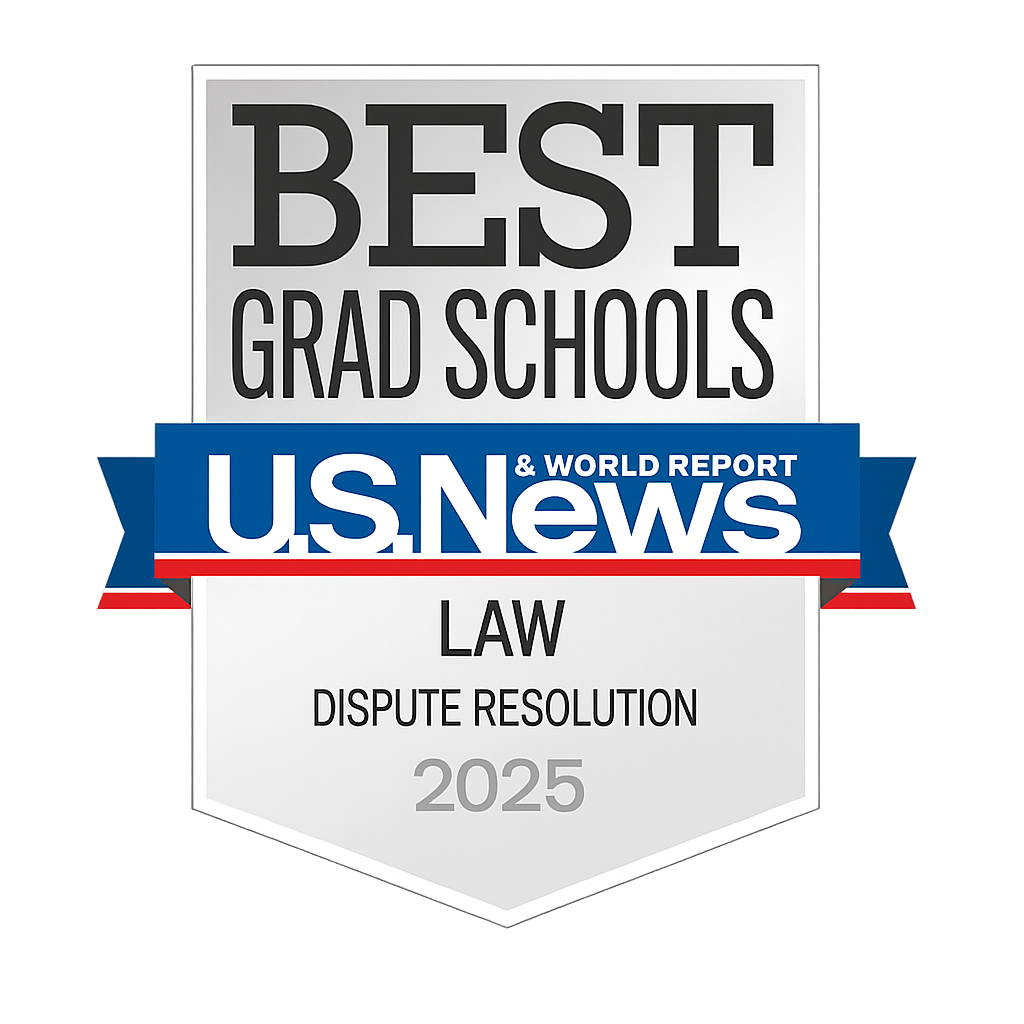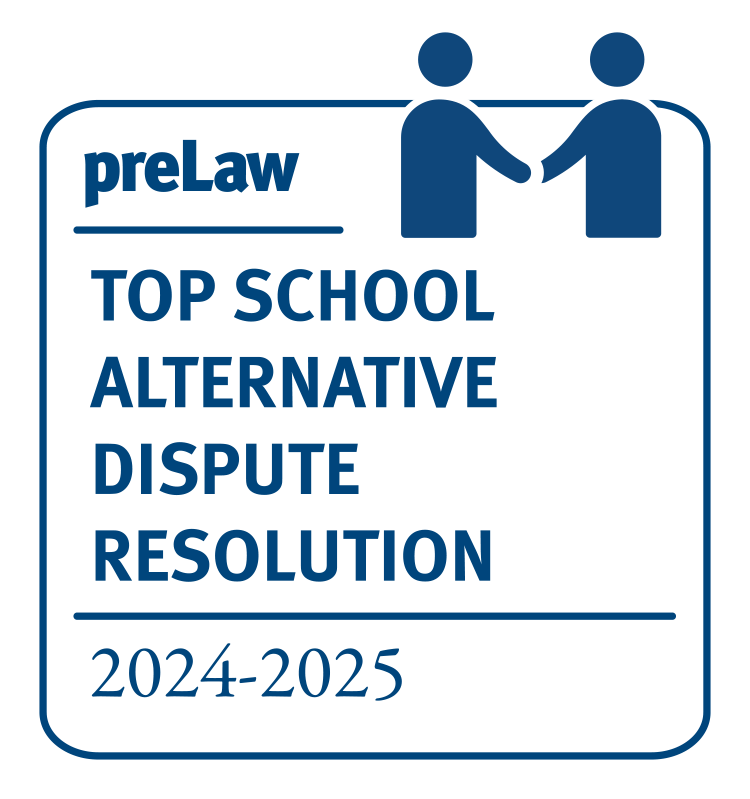Proactive conflict management, creative problem-solving, and state-of-the-art dispute resolution are critical for all organizations.
Thankfully, effectively managing conflict is a science that can be learned.
Program features
- 14-credit graduate program (as part of a law or other graduate curriculum or as a stand-alone graduate certificate)
- Complete in as little as 12 months
- Multiple formats to fit your schedule
- Flexibility between formats
With the knowledge that education is enhanced through multi-disciplinary perspectives, CCR students learn side-by-side with J.D. students and may elect to take the required courses online or on-campus. You are also free to combine online and on-campus offerings in a tailored schedule that works for your unique needs. Regardless of format, your certificate experience will deliver you the latest in the contemporary science and art of negotiation and conflict theory.
- We’ll teach you mediation because it provides a unique perspective on mutual understanding and creative problem-solving.
- We’ll teach you arbitration because it is the global forum of choice for business (and increasingly in the U.S. – for resolution of employment disputes).
- You’ll learn about the intricacies of designing (and implementing) conflict management systems for organizations large and small.
Online application process
Use the online application portal to submit your contact information and complete the Certificate in Conflict Resolution program application.
Conflict Resolution Certificate ApplicationAs part of the application, you will be asked to upload your current resume and a short personal state of purpose. Please DO NOT submit your application until these accompanying documents have been uploaded. You can leave the application and return to upload required documents at any time prior to submitting the application.
An official transcript from your most recently conferred degree must also be submitted.
Personal Statement of Purpose
Please submit a one-page personal statement of purpose outlining how the certificate program will help you meet your academic and professional goals. This statement of purpose can be uploaded via the online application.
Resume
Please submit a current resume. The resume can be uploaded via the online application.
Official Transcript
You will need to request that an official transcript from your most recently conferred degree be sent from the home institution directly to Kitty Atkins, Associate Director, Dispute Resolution Institute:
Kitty Atkins (kitty.atkins@mitchellhamline.edu)
875 Summit Avenue
St. Paul, MN 55105
Official transcripts must arrive in our office in the original sealed envelope issued by the institution. Mitchell Hamline School of Law also accepts transcripts from academic institutions via secure electronic transcript providers.
Course offerings and registration by semester
- January 2026 Term
- Spring 2026 Term
- Summer 2026 Term
- Fall 2025 Term
Admission, cost, and financial aid
Admission Requirements
- U.S. students must hold a bachelor’s degree or a graduate degree from an accredited college or University.
- Foreign students must have completed or be enrolled in an LL.B. or LL.M.
- Complete the graduate Certificate in Conflict Resolution application.
- All documents must be issued in English, or accompanied by an official, literal English translation.
English Proficiency
All Mitchell Hamline School of Law courses are conducted in English; a proficiency in English is required for all students. You can demonstrate your proficiency in one of the following ways:
- A minimum score*of the Test of English as a Foreign Language (TOEFL) of 80 on the internet based TOEFL or 550 on the paper exam is required.
- A minimum score* of the International English Language Testing System (IELTS) of 6.5.
- Proof of a conferred degree from a United States college or university within the last two years.
*Please note that scores more than two years old are not accepted.
TOEFL – http://www.ets.org/toefl | IELTS – http://www.ielts.org/
IELTS is the high stakes English test for international study, migration and work. Open a world of opportunity with IELTS.
Cost
Our total tuition costs are highly competitive and among the lowest of all conflict resolution graduate certificate programs in the country.
- Tuition: $930/credit (total of 14 credits) with no application or matriculation fees
- Limited partial scholarships available
- Your tuition rate upon matriculation is guaranteed for 2 years
- Students have up to 3 years to complete the program
Financial Aid
Students that are not enrolled in a graduate degree program are not eligible to receive federal financial aid and should not complete the FAFSA. For information regarding loans available to certificate students, connect to Certificate/Non-degree loan information.
-
See alternative financial aid options
- Outside Scholarships
- Law School Scholarships
- Minnesota Military Service Education Benefits
- Department of Veteran Affairs
- Minnesota Dislocated Worker Program
- Alternative Loans
- Tax Benefits for Education
- Employer/Union Tuition Coverage: Many employers and unions have funds available to support worker education and skills upgrades. We can provide the necessary documentation to help you take advantage of these programs through your employer or union.
Courses, Credits, and Formats
All courses are taught by nationally and internationally recognized faculty involved in alternative dispute resolution practice, research, public and teaching.
DRI Staff and Faculty Information
| Core (10 credits) | Credits | Online | On Campus J-Term |
On Campus Summer |
|---|---|---|---|---|
| Arbitration | 2 | Yes | Yes | Yes |
| Mediation | 3 | Yes | Yes | Yes |
| Negotiation | 3 | Yes | Yes | Yes |
| Theories of Conflict | 2 | Yes | Yes | Yes |
| Current Elective Options (4 credits required) |
Credits | Online | Summer | Study Abroad |
|---|---|---|---|---|
| Challenging Conversations | 1 | Yes | ||
| Family Mediation | 3 | Yes | ||
| Decision Making in a Chaotic Reality | 2 | Yes | ||
| Dispute Systems Design | 2 | Yes | ||
| Justice and Dispute Resolution | 2 | Yes | ||
| Organizational Conflict Management | 2 | Yes | ||
| ODR: Dispute Resolution in the Digital Age | 2 | Yes | ||
For Online elective credit options consult the Online Course Sequence and Schedule below.
Technology Requirements
Specific Technology Requirements
Student Advising
Upon admission, students are assigned to an academic advisor who will serve in that capacity for the duration of their program. Advisors provide counsel on the full range of academic issues including:
- Course format selection and program planning
- Registration issues
- Academic concerns
- Certificate progress
- Transfer credit requests
- The interpretation of academic policies
- Resource referrals
Questions
Contact Kitty.Atkins@mitchellhamline.edu | 651-695-7677




